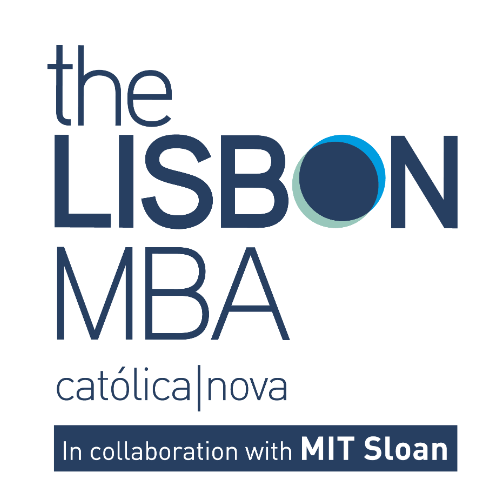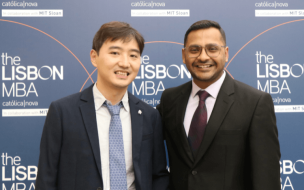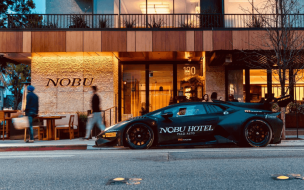Of last year’s International Full-Time MBA cohort, 15% were hired by Amazon, a number secured roles with Microsoft, and the school had its first student launch a data analytics career with Facebook.
“Tech is huge,” says Anabela Possidonio, MBA executive director for The Lisbon MBA. “We believe that the strong leadership development aspect on the course prepares students to be successful in the recruiting process.”
Although, as part of the International Full-Time MBA, students gain an in-depth understanding of technology during a four-week immersion at MIT Sloan School of Management—“they are very advanced on that part,” says Anabela—they also take classes in Talent Management, and Leadership as Acting.
A focus on developing tech-savvy graduates with augmented soft skills is key for big tech companies nowadays. Technology is changing rapidly but technical knowledge alone is no longer enough.
“Companies tell us they have smart people cognitively but that we need to develop people who can interact with each other because, more and more, leadership is about developing networks and alliances, about working together,” Anabela explains.
On The Lisbon MBA students partake in the Friday Forum, a weekly initiative designed to push students out of their comfort zone and drive their interpersonal development. “We don’t see the MBA as a theoretical course,” says Anabela, “we see it as a transformational process.”
Students learn about Managing Diversity, Building Trust, and Being Comfortable with Ambiguity and Uncertainty—they also re-enact Shakespeare plays, forcing them to adapt to different characters and build confidence when speaking publicly.
“What the companies are telling us is that we need to develop people who can lead others, not in the whole sense of being a boss, but with getting people to go with them—leaders who can be more empathetic when leading teams,” says Anabela.
Of course, she continues, on The Lisbon MBA the curriculum is also designed to build students’ understanding of the business world through modules on Financial Accounting, People and Organizations, and Uncertainty and Decision Making.
But that holistic approach, coalescing soft and hard skill development to mould graduates into strong, cognitive professionals who are also competent leaders, is why companies like Amazon, Microsoft, and Facebook actively seek The Lisbon MBA’s graduates.
“They [the companies] come here, do presentations about their programs, and then there is a networking session with the students. They really get to know them one-to-one,” says Anabela.
Many students take advantage of that and secure internships with these companies, and subsequently reap the benefits with full-time positions after graduating.
This is part of Action Learning, a prominent feature of The Lisbon MBA, one part of which is a Summer Project that requires students who opt for this path to complete a two-month consulting project with a company.
Being an international degree—the 2018 International Full-Time MBA cohort is split 50/50 between Portuguese nationals, and international students—there is also scope for international project work.
The International Lab gives students the option to work on a consulting project with fellow MBAs in Brazil, China, or Mexico—they are immersed in the cultural and personal differences that affect how business is conducted between different nations around the globe, developing a unique insight into business practices in emerging markets.
Although Anabela admits that Lisbon is “not yet like Berlin or London”, in terms of having a strong entrepreneurial ecosystem, developing and keeping talent at home in Lisbon is also part of the program’s goal.
“We are making our progress slowly,” she explains. “The ecosystem has been built—we don’t live in isolation, so entrepreneurship was at the core of the program at the beginning, and something we are trying to improve every year.”
A partnership with Startup Lisboa—a private non-profit organization that incubates the startup scene in Lisbon—means the third option for Action Learning on The Lisbon MBA is for students to work with a company within Startup Lisboa, or begin work on their own projects.
Having access to mentorship, the entrepreneurial network, and the startup community, students are able to get in front of venture capitalists, and pitch to them their ideas.
“In the past, we have experienced 10% of students [starting their own companies], but if you end up with 20% or 30% that fall on that route, then that would be a good number,” says Anabela.
RECAPTHA :
7a
74
e9
4a










